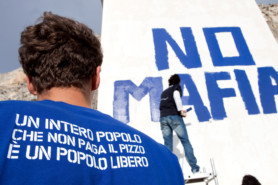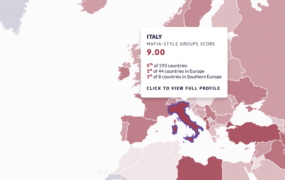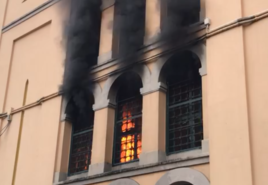Italy’s commitment to fighting organized crime has been a key aspect of its political agenda ever since the mafia killings of judges Giovanni Falcone and Paolo Borsellino. The country is internationally renowned for its effective responses to criminal syndicates and is recognized as having one of the world’s most sophisticated criminal justice systems.
The results of the 2023 Global Organized Crime Index show that Italy is one of the few countries in the world with a high level of resilience to organized crime despite having higher than average levels of crime. Notably, the country’s resilience score of 6.46 exceeds its criminality score of 6.22, demonstrating an ability to respond effectively to organized crime despite its prevalence.
An anti-mafia culture
Civil society organizations and other non-state actors, such as the Church and the private sector, play a vital role in Italy’s fight against organized crime. The country’s landscape of non-state actors committed to combating organized crime ranks among the highest in the world, scoring 7.5 out of 10 under the Index.
The diversity of Italian public and civil responses to organized crime is showcased annually at the Giorgio Ambrosoli Award Ceremony, held in honour of an Italian lawyer who was murdered in 1979 during one of his investigations. The Global Initiative Against Transnational Organized Crime (GI-TOC) participated in a panel discussion at the awards ceremony in Milan in July 2024, which held up Italy’s achievements as an example for other countries in Europe facing high levels of criminality. The awards acknowledged 15 ‘silent heroes’, including a restaurant owner who had resisted extortion.
Another notable initiative is the Trame Festival, a cultural event dedicated to combating the mafia that serves as a forum for discussion, analysis and debate in the region of Calabria, the home of the ‘Ndrangheta. The festival is a manifestation of the strength of the current anti-mafia movement in Italy and a symbol of the country’s ability to push back against the powerful organized crime networks that have long held a firm grip on the country.
These two events are testament to the recognition and appreciation that the Italian public increasingly affords to civil society groups for their efforts to curb organized crime, often in hostile environments. A 2023 survey found that most Italians believe that non-state actors play a crucial role in combating organized crime.
In Italy, civil society has focused on areas where the mafia has infiltrated local institutions, and some of these regions have undergone enormous change over the past 30 years thanks to their efforts. Leading Italian associations such as Addiopizzo and Libera are internationally recognized examples that can be adapted to other contexts across Europe to fill the gaps left by state institutions, such as by protecting victims of mafia crimes and their families, providing legal assistance during court proceedings, supporting individuals and businesses affected by racketeering, and redistributing assets confiscated from the mafia. It is also thanks to their work that in regions such as Sicily and Calabria there is no longer the tacit support for the mafia that there once was – this could suggest that Italy has managed to overcome the country’s ‘mafia culture’ and pivoted to an anti-mafia one.
Lessons for Western Europe
Through the coordination efforts of institutions such as Europol and Eurojust, European law enforcement agencies have achieved a high level of cooperation. However, while law enforcement and the organized crime networks they target are highly integrated across borders, civil society is not.
A more comprehensive approach is needed in Western Europe, particularly from an analytical perspective, to strengthen the role of civil society in countering organized crime. Despite the success of law enforcement operations, investigations often lack the context-based sociological and anthropological understanding of organized crime that is key to formulating effective policies at regional and international levels.
Civil society research and analysis are key aspects of a comprehensive approach to countering transnational organized crime. As we enter the third decade of Italian civil society’s tireless work in this area, there are four particularly valuable lessons to be learned for the rest of Western Europe – and beyond.
First, the creation of broad-based movements involving different sectors of society can effectively combat criminal influence. The Italian emphasis on education and promoting a culture of legality, as the Trame Festival has been doing since 2011, has been instrumental in changing public perceptions and transforming previously ingrained attitudes towards the mafia. This has proven to be a key building block of the high level of resilience to organized crime found in Italy today.
Second, the provision of comprehensive support systems for victims, including legal, emotional and psychological assistance, and ensuring safe reporting mechanisms to build trust in communities. In countries such as the Netherlands, Sweden and France, where the number of victims of organized crime is rising, the provision of such support is still largely neglected.
Third, Italian initiatives to use confiscated mafia assets for social good, such as creating social enterprises and community centres, show how economic empowerment can reduce the appeal of organized crime. Advocacy for stronger anti-mafia legislation and active participation in policy dialogues have been crucial to achieving legal reforms, underscoring the importance of building legal expertise. Many countries in Western Europe still lack the tools in their national legal frameworks to prosecute ‘mafia-type’ criminal associations.
Finally, in contexts where organized crime is still seen as a foreign threat rather than a domestic problem, collaborations and networking can play an important role in creating alliances between research and advocacy, raising awareness about local mafias. The Italian success in using media and digital platforms to raise awareness and mobilize support demonstrates the effectiveness of using technology in these efforts.
Taken together, these strategies have not only helped to change the public perception of organized crime, but also celebrate integrity and the rule of law, creating a cultural shift that inspires resilience.
The Observatory of Organized Crime in Europe seeks to research and analyze the growing threat of transnational organized crime in Europe and its connections to criminal markets and networks beyond the continent. It focuses on identifying emerging trends, criminal actors, and routes and hubs of illicit economies that are undermining stability, the rule of law, the licit economy and public health within Europe. The observatory took part in a Trame Festival in June, which addressed several challenges around researching and investigating organized crime.
Subscribe to the GI-TOC Observatory of Organized Crime in Europe mailing list to stay updated on our upcoming publications and initiatives.
La ricetta italiana
La società civile come elemento chiave della resilienza alla criminalità organizzata
L’impegno nella lotta alla criminalità organizzata è stato un aspetto fondamentale dell’agenda politica italiana fin dai tempi degli assassinii dei giudici antimafia Giovanni Falcone e Paolo Borsellino. Il Paese è rinomato a livello internazionale per le sue risposte efficaci alle organizzazioni criminali ed il suo sistema di giustizia penale è riconosciuto come uno dei più sofisticati al mondo.
I risultati dell’Indice Globale della Criminalità Organizzata 2023 mostrano che l’Italia è uno dei pochi Paesi al mondo con un alto livello di resilienza alla criminalità organizzata, nonostante abbia livelli di criminalità superiori alla media. In particolare, il punteggio di resilienza del Paese, pari a 6,46, supera il punteggio di criminalità di 6,22, dimostrando la capacità di rispondere efficacemente alla criminalità organizzata nonostante la sua pervasività.
Una cultura antimafia
Le organizzazioni della società civile e altri attori non statali, come la Chiesa e il settore privato, svolgono un ruolo fondamentale nella lotta alla criminalità organizzata in Italia. Il panorama degli attori non statali impegnati nella lotta alla criminalità organizzata è tra i più alti al mondo, con un punteggio di 7,5 su 10 secondo l’Indice.
La diversità delle risposte pubbliche e civili italiane alla criminalità organizzata viene messa in mostra ogni anno alla cerimonia di premiazione del Premio Giorgio Ambrosoli, evento che si tiene in onore dell’avvocato assassinato nel 1979 durante una delle sue indagini. La Global Initiative Against Transnational Organized Crime (l’Iniziativa Globale contro la Criminalità Organizzata Transnazionale, GI-TOC) ha partecipato a un dibattito in occasione della cerimonia di premiazione, tenutasi a Milano nel luglio 2024, in cui si è parlato dei risultati ottenuti dall’Italia come esempio per altri Paesi europei che devono affrontare alti livelli di criminalità. I premi hanno riconosciuto 15 “eroi silenziosi“, tra cui un ristoratore che ha resistito alle estorsioni.
Un’altra iniziativa degna di nota è il Trame Festival, un evento culturale dedicato alla lotta alla mafia che funge da forum di discussione, analisi e dibattito a Lamezia Terme, Calabria. Il festival è una manifestazione di forza del movimento antimafia in Italia e funge da simbolo della capacità del Paese di opporsi alle potenti reti della criminalità organizzata.
Questi due eventi testimoniano il riconoscimento e l’apprezzamento che l’opinione pubblica italiana riserva sempre più all’associazionismo per i loro sforzi nel contrastare la criminalità organizzata, spesso in ambienti ostili. Un sondaggio del 2023 ha rilevato che la maggior parte degli italiani intervistati ritiene che gli attori non statali svolgano un ruolo cruciale nella lotta alla mafia.
In Italia, la società civile si è concentrata sulle aree in cui la mafia si è infiltrata nelle istituzioni locali, e alcune di queste regioni hanno subito enormi cambiamenti negli ultimi 30 anni grazie al loro impegno. Le principali associazioni italiane, come Addiopizzo e Libera, sono esempi riconosciuti a livello internazionale che possono essere adattati ad altri contesti in Europa per colmare le lacune lasciate dalle istituzioni statali, ad esempio proteggendo le vittime dei crimini mafiosi e le loro famiglie, fornendo assistenza legale durante i procedimenti giudiziari, sostenendo persone e imprese colpite dal racket e ridistribuendo i beni confiscati alla mafia. È anche grazie al loro lavoro che in regioni come la Sicilia e la Calabria non c’è più il tacito sostegno alla mafia che c’era una volta – il ché potrebbe far pensare che l’Italia sia riuscita a superare quella latente “cultura mafiosa” e ad orientarsi verso una cultura antimafiosa.
Lezioni per l’Europa occidentale
Grazie agli sforzi di coordinamento di istituzioni come Europol ed Eurojust, le forze dell’ordine europee hanno raggiunto un elevato livello di cooperazione. Tuttavia, mentre le forze dell’ordine e le reti della criminalità organizzata che colpiscono sono altamente integrate a livello transfrontaliero, la società civile non lo è.
In Europa è necessario un approccio più completo, soprattutto dal punto di vista analitico, volto a rafforzare il ruolo della società civile nella lotta alla criminalità organizzata. Nonostante il successo delle operazioni di contrasto, le indagini spesso mancano di quella comprensione sociologica e antropologica della criminalità organizzata basata sul contesto locale, che è fondamentale per formulare politiche e strategie efficaci a livello regionale e internazionale.
La ricerca e l’analisi fornite dalla società civile sono aspetti fondamentali di un approccio globale al contrasto della criminalità organizzata transnazionale. Mentre entriamo nel terzo decennio di instancabile lavoro della società civile italiana in questo settore, ci sono quattro lezioni particolarmente preziose da imparare per il resto dell’Europa – e non solo.
In primo luogo, la creazione di movimenti di ampio respiro che coinvolgano diversi settori della società può combattere efficacemente l’influenza criminale. L’enfasi italiana sull’educazione e sulla promozione di una cultura della legalità, come la Fondazione Trame fa dal 2011, è stata determinante per cambiare la percezione pubblica e trasformare atteggiamenti precedentemente radicati nei confronti della mafia. Questo si è rivelato un elemento fondamentale per l’alto livello di resistenza alla criminalità organizzata che si registra oggi in Italia.
In secondo luogo, la fornitura di sistemi di supporto completi per le vittime, che includano assistenza legale, emotiva e psicologica, e che garantiscano meccanismi di denuncia sicuri per costruire la fiducia nelle comunità. In Paesi come i Paesi Bassi, la Svezia e la Francia, dove il numero di vittime della criminalità organizzata è in aumento, la fornitura di questo tipo di supporto è ancora ampiamente trascurata.
In terzo luogo, le iniziative italiane volte a utilizzare i beni confiscati alla mafia per scopi sociali, come la creazione di imprese sociali e centri comunitari, dimostrano come l’emancipazione economica possa ridurre il fascino della criminalità organizzata. L’advocacy per una legislazione antimafia più forte e la partecipazione attiva ai dialoghi politici sono stati cruciali per ottenere riforme legali, sottolineando l’importanza di costruire competenze legali. Molti Paesi dell’Europa occidentale non dispongono ancora degli strumenti necessari per perseguire le associazioni criminali di tipo mafioso.
Infine, in contesti in cui la criminalità organizzata è ancora vista come una minaccia straniera piuttosto che come un problema nazionale, le collaborazioni e le reti possono svolgere un ruolo importante nel creare alleanze tra ricerca e advocacy, sensibilizzando sulle mafie locali. Il successo italiano nell’utilizzo dei media e delle piattaforme digitali per sensibilizzare e mobilitare il sostegno dimostra l’efficacia dell’uso della tecnologia in questi sforzi.
Nel loro insieme, queste strategie non solo hanno contribuito a cambiare la percezione pubblica della criminalità organizzata, ma anche a celebrare l’integrità e lo stato di diritto, creando un cambiamento culturale che ispira la resilienza.
L’Osservatorio della criminalità organizzata in Europa si propone di ricercare e analizzare la crescente minaccia della criminalità organizzata transnazionale in Europa e le sue connessioni con i mercati e le reti criminali al di fuori del continente. Si concentra sull’identificazione delle tendenze emergenti, degli attori criminali, delle rotte e degli snodi delle economie illecite che minano la stabilità, lo Stato di diritto, l’economia legale e la salute pubblica in Europa. L’Osservatorio ha partecipato a un dibattito al Trame Festival di giugno, che ha affrontato diverse sfide legate alla ricerca e alle indagini sulla criminalità organizzata.



